| Reviews & Columns |
|
Reviews DVD TV on DVD Blu-ray 4K UHD International DVDs In Theaters Reviews by Studio Video Games Features Collector Series DVDs Easter Egg Database Interviews DVD Talk Radio Feature Articles Columns Anime Talk DVD Savant Horror DVDs The M.O.D. Squad Art House HD Talk Silent DVD
|
DVD Talk Forum |
|
|
| Resources |
|
DVD Price Search Customer Service #'s RCE Info Links |
|
Columns
|
|
|
Dirty Like an Angel (Sale comme un ange)
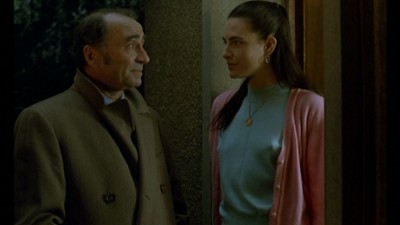
The notorious, divisive French filmmaker Catherine Breillat (Romance, Fat Girl--see what I mean?) is a feminist artist whose works are primarily concerned with female liberation and empowerment, but in terms far, far removed from most of what might make you want to roll your eyes when you read that description. There is no trace of Eat, Pray, Love/First Wives' Club faux-sisterhood chick-flickery, none of that cheap, chipper affirmation; even Thelma and Louise would be much too on-the-nose for Breillat. As already fully evident in her 1989 film Dirty Like an Angel (Sale comme un ange)--an earlier work from the Breillat filmography (which commenced in 1976 with A Real Young Girl) just released to DVD for the first time in the U.S.--"liberation" for this feminist means, first and foremost, freedom from the romantic, idealized, hypocritical categorizations and schema imposed by men on the female body and psyche. For her, this kind of liberation--which need never involve any discussions of glass ceilings, chore sharing, or battles between sexes--comes only from blithe, even reckless sexual exploration that will inevitably result, for her heroines, in a simultaneous disillusionment and unburdening.
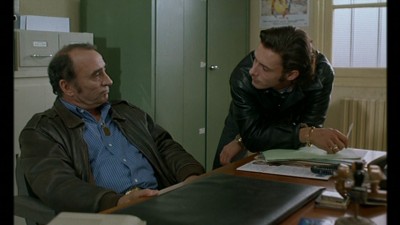
Dirty Like an Angel sets its particular iteration of Breillat's liberation legend against the background of the almost exclusively male world of a Paris police station, where inspector Georges Deblache (Claude Brasseur, Band of Outsiders, Clouzot's Inferno) and his junior partner, Didier Theron (Nils Tavernier, son of Coup de torchon director Bertrand Tavernier), do their part to blur the line between cops and the equally "masculine" world of petty criminality by violently harassing and accepting payoffs from the Arab and African small business owners and hustlers on their beat, and by behaving generally like the grizzled, corrupt, misogynistic sort of fuzz who get off by taking their little power trips as far as they can. Both the older man and his young colleague are cold-hearted serial womanizers, despite Didier's recent marriage to the gorgeous, naive Barbara (Portuguese pop singer Lio), with whom he has just set up house in a fashionable new apartment. Over a housewarming dinner, Georges falls for Barbara, whom he has always had an attraction to, if only because she belongs to a man who is basically a younger, sexier version of himself. Motivated by his love and/or lust for his friend's wife, Georges uses the misfortune of one good friend, Manoni (Claude-Jean Philippe)--a criminal with a price on his head who has to abandon his wife and young son to go into hiding--to betray another, Didier, whom he puts on round-the-clock guard duty at Manoni's place while he escorts Barbara to and from demeaning conjugal visits there and back again, taking the opportunity presented by so much time alone together to seduce her.
His quest to bed Barbara succeeds, but if his goal was conquest, victory, or possession (he labors under the midlife-crisis delusion that Barbara will divorce Didier to marry him), he has failed, as Barbara's newfound status as a sexually awake and aware, pleasure-experiencing, disillusioned-yet-liberated being (it feels good, but it's just sex, no romanticization required) easily allows her longstanding ambivalence toward this cop, whose thuggish corruption and sympathetic ties with criminals she finds pathetic and hypocritical, to evolve into outright disdain. She bids him adieu, sending him back into his empty world of bad-boy games of petty vindictiveness, a dismissal that leads the film abruptly to its violent conclusion, at which point only Barbara, who refuses to be either placed on a pedestal as virginal or consigned to the pit as a whore, has escaped the destructive patterns and oppressive categorizations that pervade the world depicted by the film. (The film exists to challenge the ostensible contradiction in its title.)
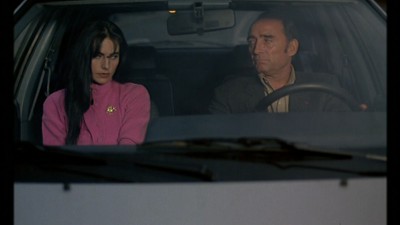
Several elements of Dirty Like an Angel anticipate Fat Girl, Breillat's masterpiece, made a decade later: the decentered narrative structure that gives precedence to a long seduction scene (done almost entirely in one unbroken shot) over other narrative details that would have primacy in an ordinary drama (more events related to Georges's corrupted police work occur in the story than do sexual encounters, yet those many events are compressed through a quicker rhythm, whereas the sex unfolds languorously, in almost real time and in acute detail, in this way occupying at least a third of the film's running time); the uniquely cool, analytical, dispassionate, and at the same time unflinchingly graphic framing of that prominent sexuality; and the seeming abruptness and unexpected violence of the film's conclusion, which kicks the last nail into the coffin of any anticipated conventional narrative symmetry or focus. This is all captured (or should I say dissected?) in jarringly clean, confident, stark, and naturalistically-lit compositions by cinematographers Laurent Dailland and Bernard Tissier.
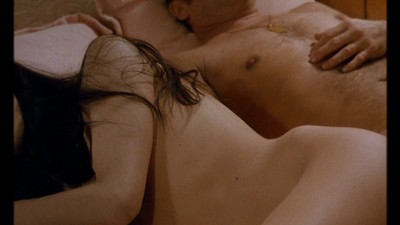
The goal of Breillat's work--a goal you may resent or find very refreshingly bracing, though I would argue that it is nearly always achieved--is to give the viewer a similar experience to that of the heroine: a disillusionment that is at the same time a liberating, if puzzling or disconcerting, reorientation toward a clearer view of the truth--the whole truth--of our received notions of sex, love, gender, and romance. Her work reveals these presumptions to be so entrenched that the films' very directness and simplicity, with the emphases merely shifted toward sexual and affective motivations and significances commonly denied pride of place in narrative feature films, come across as a radical, galvanizing, and absolutely essential challenge.
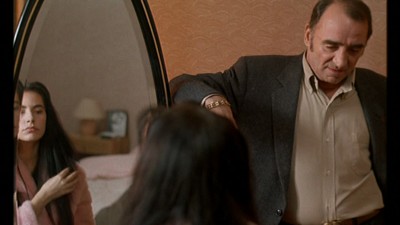
THE DVD:
Pathfinder Home Entertainment, the DVD distributor of Dirty Like an Angel, has a spotty history when it comes to how carefully they present the films they release, but here, they have done quite a good job. The disc's anamorphic-widescreen, 1.77:1 aspect ratio transfer does not suffer too badly from its intermittently noticeable aliasing and occasional flickering. Breillat's cool images generally retain their sometimes near-clinical smoothness fairly well, and colors and skin tones are mostly vivid, well-balanced, and stable.
Sound:The Dolby Digital 2.0 soundtrack does full justice to the film's restrained but purposefully constructed sound design, with all dialogue and background sound perfectly clear and full, with no sound problems to speak of.
Extras:The only extra really worth mentioning is a 15-minute interview with Breillat--always a good interview subject--in which she recounts her up-close observation of police-station etiquette and procedure as she researched the film; traces the roots of her "Joan of Arc"-like heroine in Romance back to that of Dirty Like an Angel; considers her films' mixed reception in her own country; and delves into her minutely considered theories on casting, unplanned accidents during the course of a shoot that turn out to be serendipitously perfect and have to be kept in the film (here, it's a certain unusual way the lead actress's hair came out of place), and what exactly the cinema is as compared to, say, literature (another field in which Breillat is accomplished, having published multiple well-regarded novels). Like her films, Breillat prefers to make any topics or questions reverberate rather than provide a resolution or an answer; also as in the films, it's a process of coming to comprehension that captivates even as it discombobulates.
The film's theatrical trailer was also meant to be included, but, apparently through some technical glitch, it cuts off randomly in the middle. The disc also contains trailers for several other Pathfinder DVD releases.
FINAL THOUGHTS:Once again, Catherine Breillat uses her deceptively precise style to give your mind a vigorous workout as it tries to make sense of the relations and interactions she depicts with such seemingly eccentric, troubling emphases. But as she burrows beneath and behind Dirty Like an Angel's Serpico-like police-station milieu to elliptically reveal the film's true subject--the impotence of "masculine" policemen's games when confronted with the "feminine" elements of sexuality and desire--the effect is slow-acting but profound. You may never "figure it out," per se, but you will be pondering the questions Breillat raises long after the film's startling conclusion. That particular sort of persistently unforgettable, scratch-you-can't-itch quality is, perhaps, the most convincing definition of a successful cinematic provocation. Highly Recommended.
|
| Popular Reviews |
| Sponsored Links |
|
|
| Sponsored Links |
|
|
| Release List | Reviews | Shop | Newsletter | Forum | DVD Giveaways | Blu-Ray | Advertise |
|
Copyright 2024 DVDTalk.com All Rights Reserved. Legal Info, Privacy Policy, Terms of Use,
Manage Preferences,
Your Privacy Choices | |||||||













